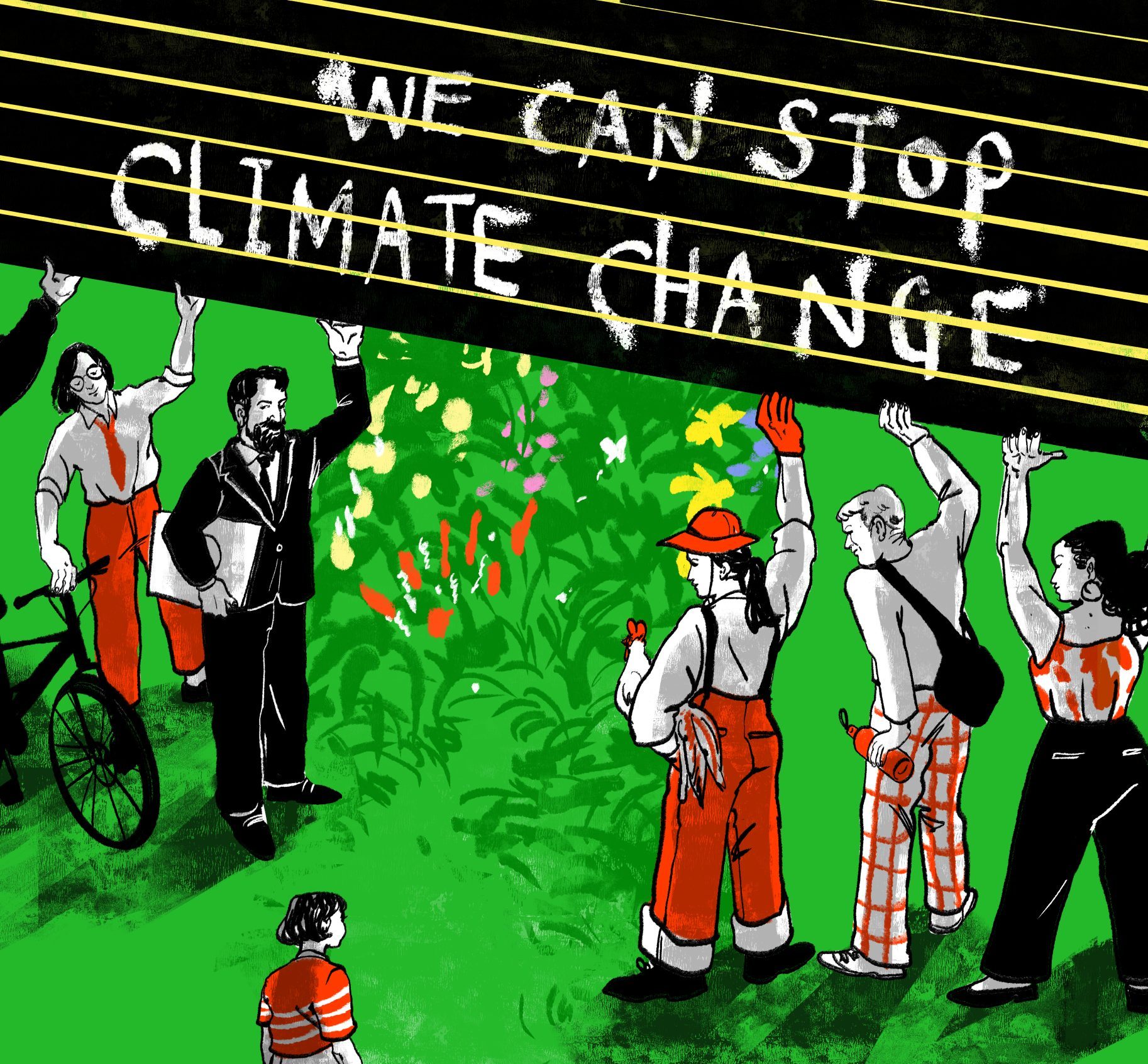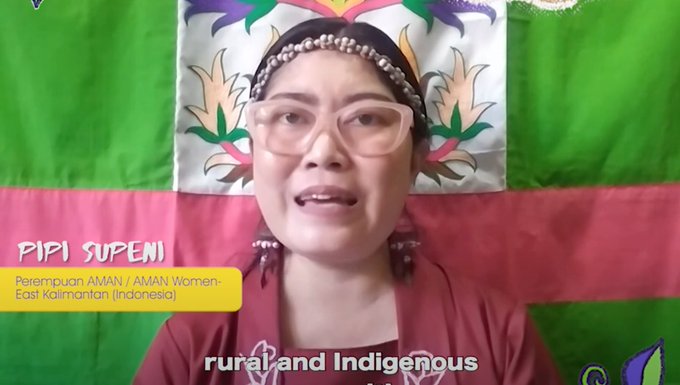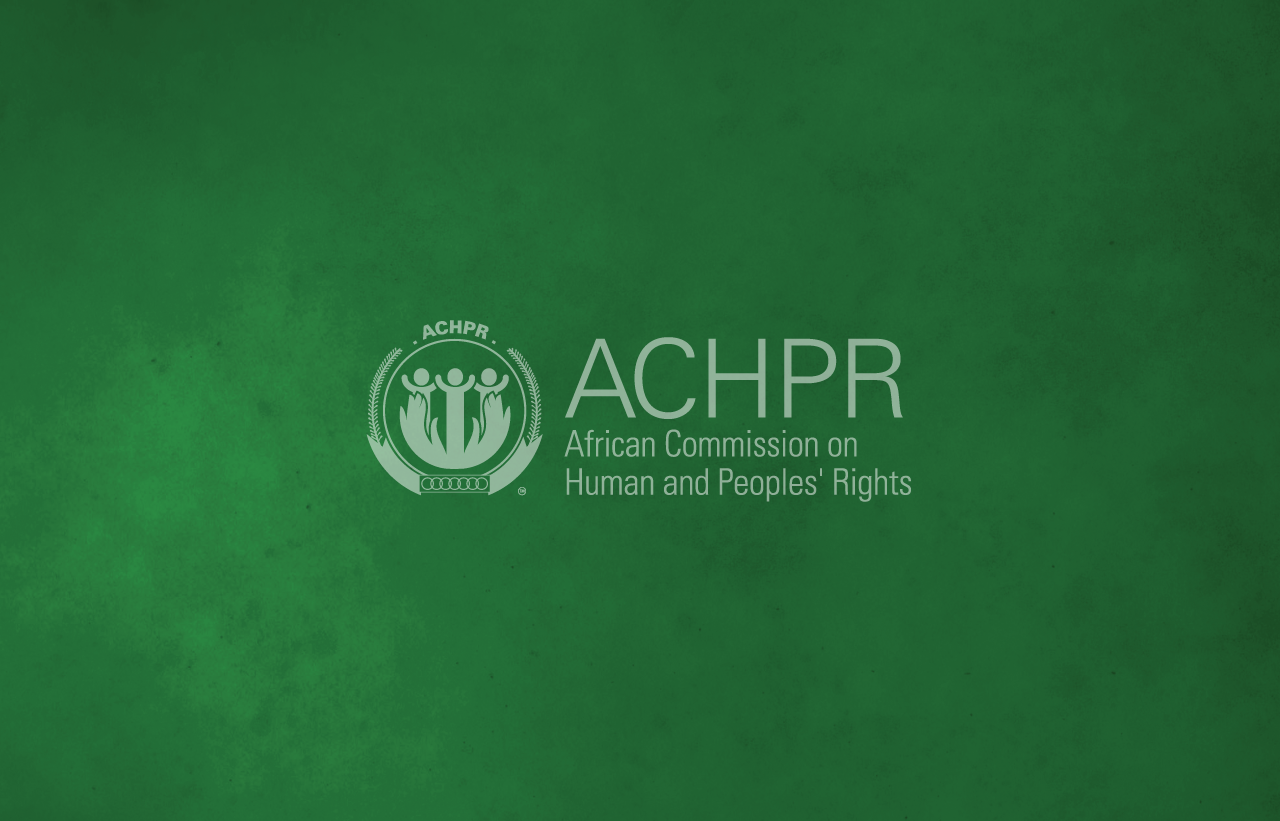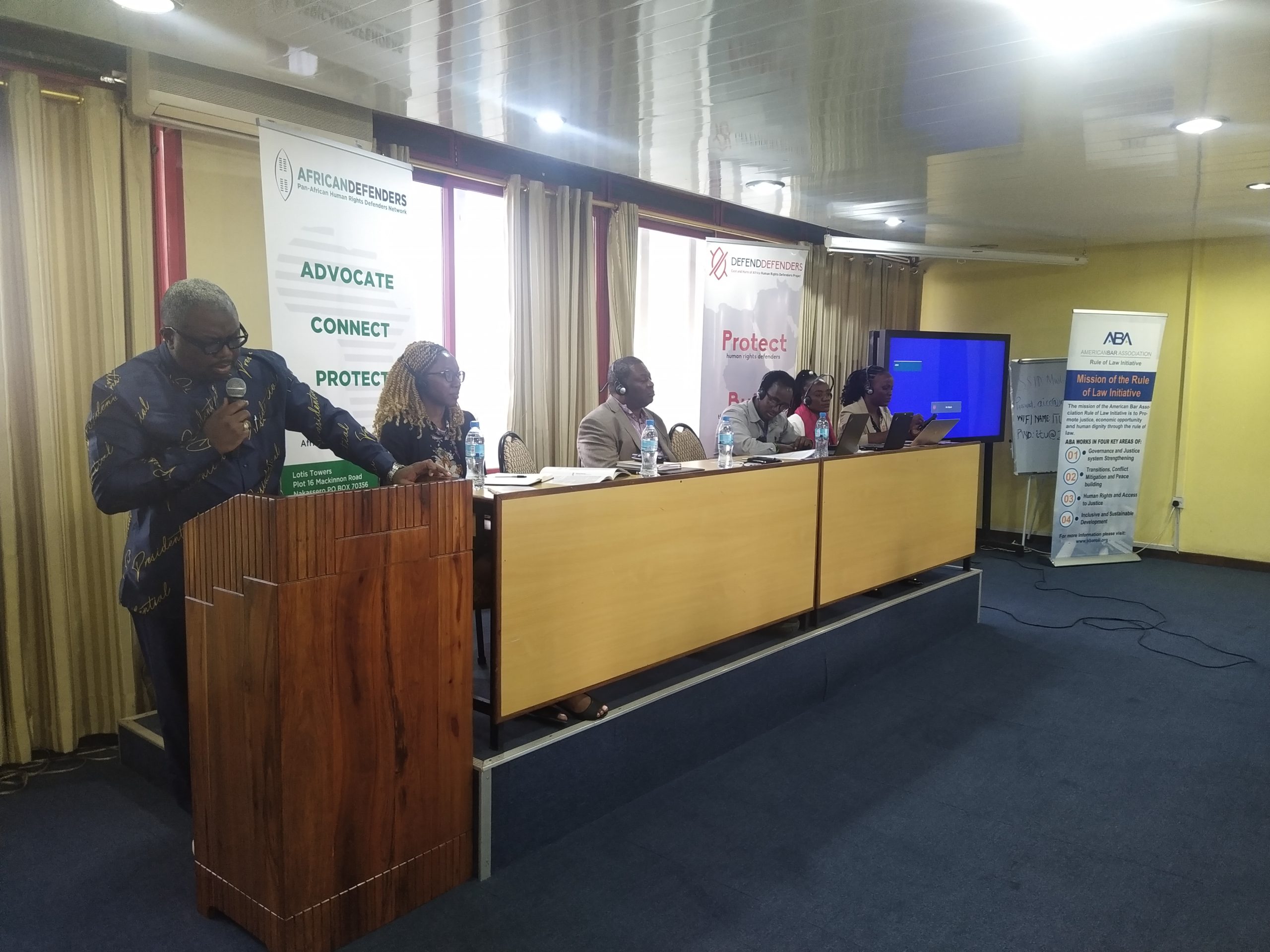“Our contributions to a healthier planet and dignified life are numerous and should be celebrated and promoted by governments and the international community”.
Women human rights defenders from across the globe are standing up to discrimination, building peace and demanding justice for their communities, protecting our environment and leading paths to climate justice. They are essential agents of change, yet face marginalisation, discrimination and racism, patriarchy and gender-based violence.
This past month, ISHR, Amnesty International, Mesoamerican Initiative of Women Human Rights Defenders (IM-Defensoras), JustAssociates (JASS), ProDESC, Urgent Action Fund for Latin America and Spanish-speaking Caribbean (UAF-LAC) and the Regional Coalition for Women Human Rights Defenders in MENA (WHRD-MENA Coalition) brought virtually together 45 women human rights rights defenders from Mexico, Guatemala, El Salvador, Nicaragua, Honduras, Colombia, Chile, Ecuador, Palestine, Myanmar, Indonesia, Philippines and Cambodia engaged in the defense of the right to land, territory, environment, water, and indigenous rights, and freedom of association and expression.
They shared their visions, hopes and struggles and strengthened their networks. Together, they demand that the UN and the international community recognize their key role in protecting humanity and the environment and that their rights be respected.
We, Women Human Rights and Territories Defenders on the Global South, work to improve people’s lives in our communities and demand respect, protection, and recognition for our contributions to the preservation of life
Land is essential for life and for the realization of human rights: land that people have lived on for generations can provide more than a home, it provides food and a livelihood.
This month, 45 women human rights defenders from Mexico, Guatemala, El Salvador, Nicaragua, Honduras, Colombia, Chile, Ecuador, Palestine, Myanmar, Indonesia, Philippines and Cambodia engaged in the defense of the right to land, territory, environment, water, traditional peoples and indigenous rights have come together virtually to share our visions, our hopes and our struggles, strengthen our solidarity networks, and demand that our rights are respected. We demand that the UN and the international community truly implement human rights, and recognize our key role in protecting humanity and nature.
Our contributions to a healthier planet and dignified life are numerous and should be celebrated and promoted by governments and the international community: we build peace and demand justice for our communities, we protect our environment and common goods from greed and destruction, we lead in sustainable paths to climate justice, and we stand up to discrimination and oppressive patriarchal structures.
The issues we face
Yet, we are affected by worsening economic conditions, the climate crisis, the lack of access to education and health services, and the growing burden, traditionally assigned to women, of care to our loved ones and our communities. By being women in the public space, we face discrimination, marginalization, racism, patriarchy and gender-based violence at the hand of State and non-State actors, as we defend our rights as women and as guardians of our communities and common goods. As women human rights defenders we are at the intersection of all of the systems of oppression built by those in power. In addition, the Covid-19 pandemic is now being used by our governments to stop us from mobilizing to defend our rights: emergency laws and new restrictions are trying to gag us and keep us in our homes, while prioritizing the encroaching of extractive industries in our lands.
Our communities are under threat from extractive industries and environmental destruction, corrupt and inept governments, armed groups and worsening climate conditions. Our communities are impoverished and displaced by conflict and violence driven by business projects that rob us of our way of life and displace us, and only serve to enrich the powerful.
We will not stay silent while we are denied basic services, we are criminalized, forcibly displaced, and vicious attacks continue to be perpetrated against us. We will make our voice heard!
Country situations
In Nicaragua, violent attacks continue against the Indigenous communities of the Atlantic coast, forcibly displacing them from their sacred lands. In August, 13 Mayagna and Miskitu community members were massacred by non-Indigenous, heavily armed men. Two women were also raped before being killed. The state apparatus continues to repress civil society and those who speak up to protect the lives of others, and 10 women political prisoners continue to be detained. More laws to annihilate any opposition to the Ortega government and to criminalize and eliminate civil society and opposition have been adopted. This is all happening despite resolutions on Nicaragua adopted at the UN Human Rights Council in 2020 and 2021.
El Salvador is sadly going in the same direction, with increasing authoritarianism and hate speech against feminist women human rights defenders. Women in El Salvador are doing vital work defending sexual and reproductive rights, and to preserve vital water resources from being sold off to private corporations for residential and tourist projects depriving local communities of this basic good.
Honduras continues to be a deadly country for environmental defenders. There is no news of the five Garifuna defenders forcibly disappeared in 2020 while eight Guapinol defenders have been held arbitrarily for 2 years, just because they fought for the safety and livelihoods of thousands of people, by opposing a mining project which threatens those basic rights. Hydropower projects continue to affect the right to water and displace communities, and mining projects are granted by the government without the consent of Indigenous peoples. Corruption is so widespread in Honduras that there is no rule of law.
In Mexico, women defending the right to land and territory work in a context in which violence against women is normalized. We face killings and criminalization and our risk has increased because of the stigmatizing speech coming from the authorities at the highest levels. For example, members of Mexicali Resiste are criminalized for defending their right to water against the state government and the transnational brewery “Constellation Brands”. In Sierra Norte de Puebla, indigenous peoples are standing up for their lands and livelihoods by fighting against the construction of a hydroelectric project to generate electricity for Walmart. In Unión Hidalgo our sisters are claiming their right to participate in decision making about the future of their communities, and fight to protect their territories and livelihoods from imposed French wind farms on their lands.
In Guatemala, historic discrimination against Indigenous peoples goes hand in hand with imposition of extractive projects on communities by the authorities. The members of La Puya Peaceful Resistance have faced false prosecutions for their work to protect their communities and opposition to a mining project.
In Chile, the impunity for death threats, kidnap attempts against the children of activists, and constant harassment, shows the impact of the lack of a governmental framework to prevent attacks, and provide protection, accountability and access to justice for defenders. In 2016, Macarena Valdés, defender of the Mapuche Newen Tranguil community, was murdered in front of her little child, and we still do not know the name of the perpetrators of this femicide linked to her resistance to a hydropower project.
Colombia is one of the deadliest countries in the world for environmental defenders, local and Indigenous leaders, along with the reintegrated people after the burial of the Peace Agreement by the actual government of Iván Duque. This year we witness the brutality of his government´s repression to the right to protest; violence and assassinations targeted to young people, racist speeches for indigenous and campesinas communities congregated in the Minga nacional, sexual violence against women driven by police force and, again, the disappearances of people and the appearance of dead bodies on our rivers. In 2021 the actualization of the number of the so-called Falsos positivos that occurred during the government of Álvaro Uribe Vélez, confirmed that more than 6.400 arbitrary assassinations of civil society members were perpetrated by public force during his mandate. In this context, WHRDs are being criminalized and have no guarantee for their protection.
In Palestine, women defending their right to land continue to face criminalization, detention, dispossession and impunity.
The coup and the ensuing brutal repression in Myanmar is affecting not only defenders but also entire communities, particularly the families of human rights defenders. Security forces related to extractive projects, use sexual violence against women defenders, leaving an inmesurable impact in the life of women and communities who have a vital work of preserving nature, life, culture and heritage. We demand an end to the violence and the release of detained defenders.
In Indonesia our lands are taken and destroyed by the extractive industries, particularly in Java and Kalimantan. While Covid restrictions are imposed on us by the authorities, business interests have accelerated their take over of our natural resources. When they enter our communities, we face not only pollution and destruction, but also increasing violence against women, trafficking and sexual exploitation. Our belief system is mocked and our rights are stamped on. We urgently need laws that protect local communities, with a gender and indigenous perspective.
In Cambodia, large scale projects including hydroelectric dams – which are touted as green solutions but are not in line with real climate justice – are taking away our land, resources, and destroying our culture. Due to the displacement our children are missing out school, and girls fear being sexually assaulted on the way to school. Due to the Covid-19 restrictions imposed by the government we are not allowed to exercise our right to meet and organize, yet perpetrators continue attacking us with complete impunity. Yet we are criminalized very quickly if we dare to speak up.
In the Philippines, the harmful impacts of state-perpetrated violence are felt across the country, limiting many freedoms of the people. With the COVID-19 pandemic, militarist lockdown measures and quarantine restrictions were enforced to control the virus, but in effect were meant to control the people’s mobility and stifle dissent. Even before the pandemic, tens of thousands have already been killed as a result of the Duterte government’s “drug war”, “war on dissent”, and “war on terrorism”. WHRDs continue to be victims of political killings, some are red-tagged, arrested, and criminalized. Despite this human rights crisis, WHRDs join the rest of the Filipino people in addressing and responding to the people’s needs — from community kitchens, relief efforts, psychosocial services to urban gardening and bungkalan (collective farming), alongside campaigns for mass testing, immediate economic assistance and transparency and accountability in the COVID-19 response.
We keep on working to protect life and call the UN to join
Despite all this we continue in our struggle for survival. We choose to defend our communities and we do it in honor of our brothers and sisters who have suffered and are no longer with us. We cannot wait for unfair and slow legal processes or hope that the next government will grace us with rights that are already ours.
We demand a plan for radical global change, putting women and indigenous people at the center of the Covid recovery, at the center of climate justice, creating economic models that do not rob people of their livelihoods, cultures and lifestyles, and a society that brings justice to those who have been displaced, killed, attacked, persecuted, discriminated and ignored for too long.
While our governments continue to violate our rights, we demand the UN and the international community to:
- take action against States that continue to allow impunity for hundreds of killings of environmental human rights defenders and women human rights defenders every year
- recognize that the criminal justice system is used as a tool of repression against us. Join in our calls that those detained arbitrarily or solely for defending human rights must be released immediately and false charges must be dropped. Indigenous peoples are particular victims of the criminal justice system which is used unfairly against us
- demand governments and business to act respectfully and always extensively consult and listen to communities, instead of imposing extractive and damaging megaprojects, including those that are touted as “green” projects, because they lead to displacement, destruction and violence in our communities, including sexual violence against women and girls
- call out those States that are introducing laws to shrink our rights to freedom of expression, association, assembly, which are essential tools in our work as defenders.
- develop strong tools to bring to account business enterprises who abuse our rights and ensure they are not financed – existing voluntary schemes and principles are not working, instead they are used to greenwash the destruction and violence brought by extractive companies.
- Call to urgently protect and promote women human rights defenders and end stigmatization, hate campaigns and digital attacks against them.
- Provide flexible resources for women human rights defenders and their organizations to guarantee their holistic protection
- Promote public policies focused on the recognition and redistribution of the burden of domestic and care work and encourage a more equitable participation in public spaces and decision-making by women human rights defenders
Download their full statement in English and in Spanish.




